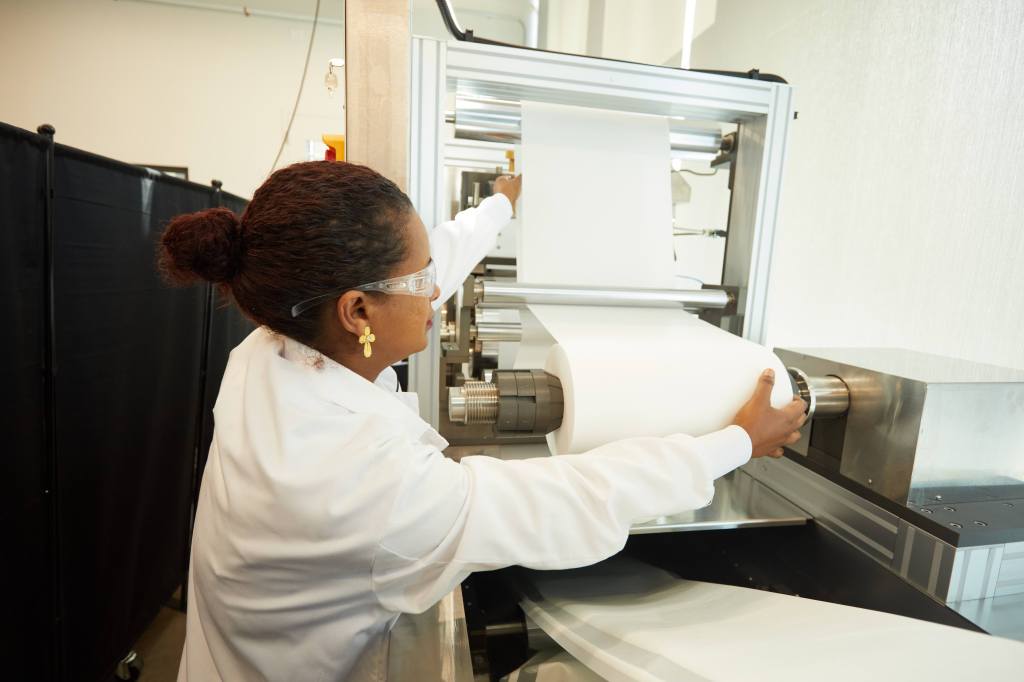A whopping 10% to 15% of the world’s energy goes toward something that, unless you’re a chemical engineer, you probably never think about: separating gasses.
Most of that happens the old-fashioned way by boiling different gasses off the top of various liquids, many of them petrochemicals. As simple as that sounds, the equipment needed to do that is usually enormous. Chemical refineries, for example, can resemble sprawling cities, their distillation columns towering over a web of pipes. All that boiling requires a lot of heat, which tends to come from fossil fuels.
There’s another way, though, called membrane gas separation. In it, a membrane works like a filter, allowing the desired gas or gasses through while leaving the others behind. With membranes, there’s no need for heat, just pressure, something an electrically powered compressor can provide. No fossil fuels required, and the potential for energy savings could be significant.
Today, membrane gas separation represents a relatively small part of the market. But with calls to decarbonize heavy industry, that could change. Osmoses, a startup spun out of MIT and Stanford, is hoping to capitalize on that with a new type of membrane that the company says is more selective and less energy-intensive than others on the market today.
Osmoses makes membranes that are so thin — just a few hundred nanometers — that they need to be plied with additional layers to give them structure. In that wispy-thin layer are holes that are mere angstroms wide, “about the same size as gas molecules,” said Holden Lai, co-founder and CTO of Osmoses.
Lai and Francesco Maria Benedetti, co-founder and CEO of the startup, helped develop the new membrane with their university colleagues, and started the company along with Katherine Mizrahi Rodriguez and Zachary P. Smith in 2021. The team quickly raised a $3 million pre-seed round in November of that year with an $8 million post-money valuation, per PitchBook.
Now the company has raised an $11 million seed round, TechCrunch+ has exclusively learned. The round was led by Energy Capital Ventures with participation from Engine Ventures, Fine Structure Ventures, New Climate Ventures, Collaborative Fund, Little Green Bamboo, BlindSpot Ventures and several angel investors. The company did not disclose an updated valuation with the new funding.
Osmoses is starting with the hydrogen market. “It’s really one of the molecules that is defining the energy transition in terms of alternative gas molecules that can replace current solutions,” Benedetti told TechCrunch+. “Hydrogen is the one that shows the highest potential.”
The company believes its membranes will find a home in hydrogen producers who use pyrolysis — a way of separating hydrogen from methane without producing CO2 — and pipeline operators who transport hydrogen alongside natural gas.
With the seed funding, the company is working toward pilot plants that it plans to deploy next year or the year after, Benedetti said. Osmoses will work with customers to design the membranes, and it will engage other engineering firms to handle the rest of the necessary equipment.
Benedetti said that the company’s membranes are cost competitive with both existing membrane technologies and distillation techniques when a company is designing a plant from scratch. Osmoses isn’t seeking to replace existing distillation equipment.
That approach is sensible, though it will limit its growth potential until some of those facilities either reach the end of their life or, more realistically, regulations force them to shut down.
That Osmoses is targeting hydrogen shows just how much of an impact the Inflation Reduction Act has had on the sector.
Previously, hydrogen’s champions were largely limited to companies like Toyota, which until recently didn’t seem to take batteries seriously, and airplane manufacturers, which were thinking hydrogen might replace jet fuel 50 or so years from now.
Back in 2021, when Osmoses pitched judges at the MIT $100,000 startup competition, hydrogen was a footnote in its slide deck. Then its beachhead market was natural gas producers. But now with tax credits worth up to $3 per kilogram, hydrogen has suddenly become a hot commodity, even if it’s still a ways away from being tracked by analysts as one. Did investors push the change? It’s hard to imagine they didn’t.
Like many parts of the climate tech sector, it’s still too early to tell whether Osmoses will succeed in cracking a profitable portion of the hydrogen market open. Perhaps another market will be more lucrative, but with the IRA’s subsidies guaranteed through 2032, hydrogen will be hard to ignore.





























Comment